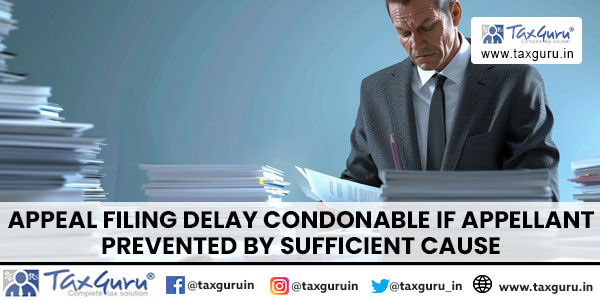The recent ruling by the Tamil Nadu Appellate Authority for Advance Ruling (TN AAAR) in the case of M/s. Faiveley Transport Rail Technologies India Limited sheds light on the vital provision of condonation of delay in filing appeals under the Central Goods and Services Tax Act, 2017 (CGST Act). Tamil Nadu AAAR, in this case held that the delay in filing the appeal by the Appellant beyond the normal time limit of 30 days is condoned in terms of proviso to Section 100(2) of Central Goods and Services Tax Act, 2017 (“the CGST Act”) / Tamil Nadu Goods and Services Tax Act, 2017 (“the TNGST Act”) if sufficient cause is proved.
Facts:
M/s. Faiveley Transport Rail Technologies India Limited (“the Appellant”) was a private limited company under the administrative control of ‘STATE’. The Appellant was engaged in the business of manufacturing, supplying, and exporting equipment for the Rolling Stock industry. The said equipment included inter alia, railway door systems, grills for train coaches, braking systems, and pantographs for railways.
The Appellant had applied for Advance Ruling concerning the applicability of GST and eligibility of Input Tax Credit (“ITC”), before AAR who vide Ruling No. 125/AAR/2023 dated December 20, 2023 pronounced the decisions for the respective queries raised by the Appellant. The Appellant was aggrieved by one such decision on the issue relating to the query “Whether GST is applicable on the facility of car extended to the employees of the Assessee in the course of employment?”. The AAR ruled that GST is applicable to such services.
The Appellant received the Advance Ruling No. 125/ARA/2023 dated December 20, 2023 passed by the AAR through e-mail on February 16, 2024 (“the Impugned Ruling”).
Hence, aggrieved by the Impugned Ruling, the Appellant filed an Appeal and petition for condonation of delay before the Appellate Authority for Advance Ruling on April 12, 2024.

Issue:
Whether delay in filing an appeal could be condoned if the appellant is prevented by sufficient cause?
Held:
The Tamil Nadu AAAR, in A.R. Appeal No. 03/2024 AAAR held as under:
- Observed that, the Appellant received the advance ruling on February 02, 2024. Therefore, as per Section 100(2) of the CGST Act, the Appellant should have filed an Appeal before the Appellate Authority for Advance Ruling by March 16, 2024. However, the appeal was filed after a delay of 27 days i.e. on April 12, 2024. The appeal was filed within the condonable time limit of 30 days.
- Opined that, the Appellant was prevented by the sufficient cause from presenting the appeal for this medical certificate was furnished at the time of the personal hearing which stated that the Chartered Accountant, representing the certificate was under treatment owning to health issues from March 05, 2024 to March 15, 2024. Further, on March 14, 2024, a letter was furnished to the Commissioner of Commercial Taxes, Chennai in this regard seeking an extension for filing an appeal.
- Held that, going by the documents available on record, the Authority believed that they had a sufficient cause that prevented the Appellant from filing an appeal within the normal period. Therefore, the delay of 27 days beyond the normal time limit in filing the appeal is condonable under Section 100 (2) of the CGST Act. The authority is empowered under Section 101(1) of the CGST Act to pass such orders as deem fit. Hence, the appeal will be taken up for consideration on merits.
Our Comments:
Section 100 of the CGST Act talks about “Appeal to Appellate Authority”. According to Section 100(2) of the CGST Act, every appeal under this section shall be filed within a period of thirty days from the date on which the ruling sought to be appealed against is communicated to the concerned officer, provided that the Appellate Authority may, if it is satisfied that the appellant was prevented by a sufficient cause from presenting the appeal within the said period of thirty days, allow it to be presented within a further period not exceeding thirty days.
In Pari Materia case of Arun Cooling, In re [Order AAAR/2024(AR) dated January 22, 2024] the Tamil Nadu AAAR, held that as per Section 100 of the CGST Act, an appeal has to be filed within 30 days from date of communication of AAR order that is sought to be challenged and appellate authority is empowered to allow an appeal to be presented within further period not exceeding 30 days if it is satisfied that assessee was prevented by sufficient cause from presenting the appeal within the initial period of 30 days. In the instant case, there had been a delay of 920 days from the last date of filing the appeal under Section 100(2) of the CGST Act. Hence, the Appellate Authority was not empowered to condone said delay in filing. Therefore, the appeal filed by the assessee was to be dismissed on grounds of limitation without going into merits.
Conclusion
The TN AAAR’s ruling in M/s. Faiveley Transport Rail Technologies India Limited case elucidates the legal principle that delays in filing appeals can be condoned if sufficient cause is proven. This interpretation of Section 100(2) of the CGST Act ensures fairness and flexibility in the appeals process, balancing procedural requirements with the need for justice. Taxpayers should diligently adhere to timelines while leveraging the provision for condonation when genuine impediments arise.
********
(Author can be reached at info@a2ztaxcorp.com)





